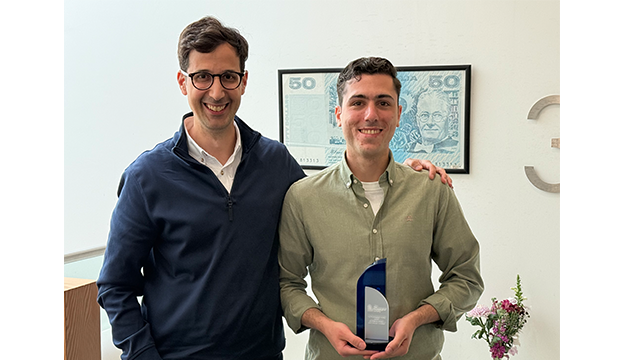Jose Cabezas-Caballero awarded prestigious Physiological Society Prize
 In March, Jose Cabezas-Caballero from the Dushek group was selected from hundreds of applicants as one of only 30 biological and biomedical sciences finalists to present his DPhil work at STEM for BRITAIN. Organised by the Parliamentary & Scientific Committee and held at the UK parliament, this event aims to showcase the excellent early-career research taking place at UK Universities to MPs, Lords and members of scientific societies.
In March, Jose Cabezas-Caballero from the Dushek group was selected from hundreds of applicants as one of only 30 biological and biomedical sciences finalists to present his DPhil work at STEM for BRITAIN. Organised by the Parliamentary & Scientific Committee and held at the UK parliament, this event aims to showcase the excellent early-career research taking place at UK Universities to MPs, Lords and members of scientific societies.
Jose’s PhD thesis work focused on T cells, immune cells that are able to destroy infected or diseases cells, such as cancer cells. T cells have a tremendous therapeutic potential, but can also accidentally attack healthy tissue. Jose’s work focuses on engineering T cells to recognise and target only diseased cells, improving both their precision and safety in treatment.
Judged by a panel of experts, the Physiological Society Prize highlights a physiology researcher, their work, and its significance in influencing health policy. Professor Mike Tipton (Chair of the Policy Committee) said:
“Every year we award The Physiological Society Prize to an early career researcher in physiology whose research stands out for being novel, robust and important. Awarding Jose The Physiological Society Prize is a testament to his excellent research on increasing the precision of T cells for cancer therapy, which could improve the efficiency of this treatment and the health of individuals living with cancer”
Professor Heidi de Wet (Trustee of the Physiological Society) and Mr Tom Addison (Policy and Public Affairs Manager at the Physiological Society) recently visited the Dunn School to award Jose his trophy.
On his award, Jose said:
“I am honoured to have been awarded the Physiological Society Prize at STEM for Britain this year. I am particularly thrilled to receive this award, because as a result, I have been invited to become a member of the Parliamentary and Scientific Committee.
I was really excited to be selected, together with Poppy Holland-Kaye (Jordan Raff lab), to present my research in Parliament. It was great to discuss how my own research tackles real world problems with such a diverse audience.
I am very thankful for all the support I have received throughout my PhD from the Dunn School, and especially my supervisors, Omer Dushek and Anton van der Merwe. I really appreciated the opportunities to continuously present my research at progress seminars and student symposiums to scientists from different backgrounds at the Dunn School. These experiences were very helpful for STEM for Britain, as they taught me to communicate the key concepts of my research effectively to people that are not necessarily familiar with T cells or Immunology.”
Dushek lab
Understanding how the immune system discriminates between normal and abnormal tissues, and harnessing this knowledge to develop new therapies
Infection & Immunity
Several Dunn School groups use a range of approaches to investigate antigen presentation and immune regulation during health and disease and study the mechanisms that enable bacterial and viral pathogens to invade and proliferate inside their hosts.
News
For research and social news from across the Dunn School read the latest on our news pages.